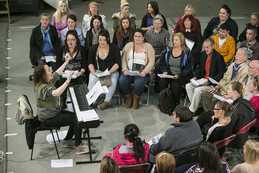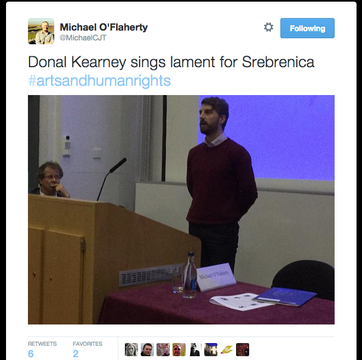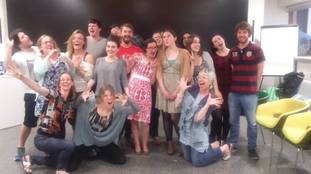BlogStories, Research & Projects
|
 The High Hopes Choir is a group of singers who are united by their experiences of homelessness. The original RTÉ documentary features choirs from Waterford and Dublin. On Monday evening, my request to attend the Dublin rehearsal was accepted. The Focus Ireland staff I dealt with were so accommodating and I really enjoyed being witness to this group at work. When I walked into the northside chapel where they rehearse, I was greeted by about 20 seated singers engaging in the usual pre-rehearsal chit-chat. Feeling very much the outsider, I was soon welcomed by Glenn of Focus Ireland and the choir master, Carmel Whelan. Although I was completely unaware of who was taking the High Hopes Choir since David Brophy stepped down in December, I met Carmel for the first time a few weeks ago! She was a delegate at the 3rd Anúna International Summer School, which took place in Dublin from 24th - 27th June 2015. We had 50 delegates from 14 different countries. I was a facilitator of that Summer School, so it’s a strange coincidence then that I walked in on her working with her own choir. I suppose that’s Dublin for you! Carmel got to work warming up the voices that had had a week off. Normally, the group meets every Monday, but due to illness, the previous week’s rehearsal had been cancelled. This is a very uncommon occurrence, but I was told that it can have a knock-on effect in attendance. The singers are used to the routine, and upsetting this routine can be a put-off. Right enough – numbers were down from the 35-strong choir that usually turns up. It is fantastic to see the commitment of these individuals and the ongoing drive to make music. For any musician, this is everything. It's all the more inspiring due to the obvious hardships that go hand in hand with homelessness, the extent of which most of us cannot begin to fathom. The High Hopes Choir works according to the direction of a committee made up of the singers themselves. Focus Ireland, the Dublin Simon Community and St. Vincent de Paul collaborate on the choir, but decisions are taken internally amongst the singers. And they are in demand! Performing at Áras an Uachtaráin last weekend – a week before our Nova Collective gig there – and looking forward now to a set at Electric Picnic. The thing I noticed most was the concentration and intent during rehearsal. And the laughter. They all seemed to be having a great time. They’ve created a community and a purpose. This is what singing together is all about: unity. I hope to remain involved in some capacity with the High Hopes Choir. I left the place on a buzz. There are so many community arts initiatives of value and the High Hopes Choir is certainly making waves.
Carmel asked me to sing a song before I left. After all, they’d let me sing with them. I chose to sing The Sheepstealers. That song tells a story about a man doing something that he knows is wrong. But he does it because he has to.
1 Comment
 Last week, I attended the NUIG International Summer School on the Arts and Human Rights. As an alumnus of the Irish Centre for Human Rights, I was very comfortable returning to discuss issues of international human rights law. This time, the rights theory was infused with artistic critique. The closest thing I’d come to this combination previously was during the Human Rights Council at the OHCHR, Geneva, when artists advocated for civic freedoms through the practice of their work. I came across countless artist human rights defenders in my work with Front Line Defenders in Dublin. There are people across the world using their talent, their energy, and their time to promote the human rights of others. This is all the more admirable in states where the statements made by the artists breaches domestic law. For example, a rapper who records a track lambasting government policy may find herself subject to criminal proceedings in some east Asian states. The NUIG Summer School looked at the interface between artistic and human rights practices. In attendance were legal practitioners from across the world, current and former UN Special Rapporteurs, heads of international NGOs, academics in the field of human rights, as well as high-profile musicians, artists, curators and producers. An eclectic array of opinions served up a fascinating discussion over the two days I attended (I missed the opening day thanks to a wedding gig in Newry!). On the second day, I was selected to present in the workshop on Music and Human Rights on the theme of “Belonging”. The facilitators were Executive Director of Musicians for Human Rights, Julian Fifer, and former UN Special Rapporteur on Torture, Manfred Nowak. Fair play to NUIG for assembling such an awesome team! My presentation addressed the power of song in the process of fostering a shared identity and community-building. Of course, songs can divide as well as unite – and this was one of the first questions that came back at me once I’d finished the presentation. I’ll be completing a document on my presentation, so I will post it on this blog in coming weeks. Indeed, an emerging theme of the Summer School on “Belonging” was how readily the debate turned to Exclusion. With any in-group, there is an out-group (‘the Other’). Art plays a role in bringing people together, but it can also pit communities against each other – especially in examples such as nationalistic imagery, songs in a particular language, or openly sectarian music such as that broadcast in Rwanda in 1994. For instance, singing in the Irish language arguably excludes those who do not understand the lyrics. An interesting topic of discussion might be to consider art that does not exclude, but rather includes everyone in a society. Please contribute in the comments below if you’ve any immediate thoughts! On the third day of the Summer School – 11 July 2015 – the Summer School marked the 20th anniversary of the Srebrenica massacre. Between 11-13 July 1995, Bosnian-Serb forces entered what was thought to be a UN-protected “safe area” in Srebrenica. Within a matter of days, 8000 Muslim Bosniaks had been murdered in what is considered to be the worst military atrocity since the Second World War. After a lecture given by Manfred Novak on the significance of music during the war in Bosnia-Herzegovina, Professor Michael O’Flaherty of the Irish Centre of Human invited me to perform a song in memory of the victims of Srebrenica. Despite the short notice, I decided to sing an 18th century Irish song about a man thinking back to his lost lover from a distant war: Coinleach Ghláis an Fhomhair. The Summer School encouraged me to continue with my project through The Ideas Collective. There are so many merits to the methodology of using songs to give people a platform to use their voice. There are many pitfalls too, it seems – and people can be very quick to point these out. It’s difficult to know what to do. At a very simple level, I believe the act of singing can bring something out of a person that they may not have believed they were capable of. The main thrust of my project, however, is the chance to bring together an audience and to allow someone to tell her/his story to people who may not otherwise have listened before.  Last weekend, I attended the second weekend session of The Ideas Collective, a 100-day programme coordinated by Dublin charity, SUAS. The aim of the programme is for a group of participants (including me) to develop an idea for a social or environmental project into a practical plan. I applied for The Ideas Collective with an idea in May, but I can safely say that my idea has evolved. In this blog, I’ll outline where my project idea stands at present. A bit about my background. I read Law at the University of Cambridge and completed a Master’s in International Human Rights Law (Distinction) at the Irish Centre for Human Rights. I’ve been involved with non-governmental organisations across the UK and Ireland and in 2014, I worked at the UN Office of the High Commissioner for Human Rights (OHCHR) in Geneva. Currently, I’m a full-time professional singer, teaching, recording and touring with Anúna, Nova Collective and Tourist Walk. This weekend, I will present at the NUIG Summer School 2015 on the Arts & Human Rights about how singing fosters belonging in a community. As I consider the effect of singing on community, I naturally turned to the songs of my local area – Newry, the Mournes and Carlingford Lough – and I intend to publishing a songbook of my research within the next six months. It’s a year since I left the OHCHR and I’ve reached a point where I want to combine the two passions in my life: singing and rights-based advocacy. With the support of The Ideas Collective, I’ve developed an idea in the hope of growing it into a nationwide community of human rights advocates. My project [provisionally entitled either COMMONSONG or COMMONPLACE... Any thoughts are welcome!] entails hosting a series of song workshops for participants from marginalised groups across Ireland. In these workshops, we intend on developing both the soft and hard skills of individuals who agree to participate in the project. Their contribution will be centred around the performance of a favourite song. I will work with participants directly on singing technique, breathing, musical expression, etc. Through this process, the participants are encouraged to explore their own story and talk about their experiences with the goal of speaking/singing in public. At the end of the series of workshops (5-6 weeks), we will invite community & voluntary sector workers in the relevant field, as well as music-lovers and local communities, to attend a pop-up Gathering featuring other well-known musicians. For example, if the participants are affected by homelessness in Dublin, we would invite key stakeholders in that field such as Focus Ireland and the Dublin Simon Community to attend the Gathering. We would invite local, ordinary citizens (especially music-lovers) to attend, and well-known professional musicians will also perform at the Gathering. I’m in the process of collecting a list of interested musicians from Dublin. The project participants will perform the song(s) they have worked on through the workshops. This way, the project provides a platform for participants to share their story with an engaged audience. Through the workshop series and the gatherings, the project can create a community of human rights advocates through song. Any thoughts you have at this stage on what you've just read are very much appreciated! Please get in touch. x |
AuthorDónal Kearney Categories
All
Archives
February 2018
|
